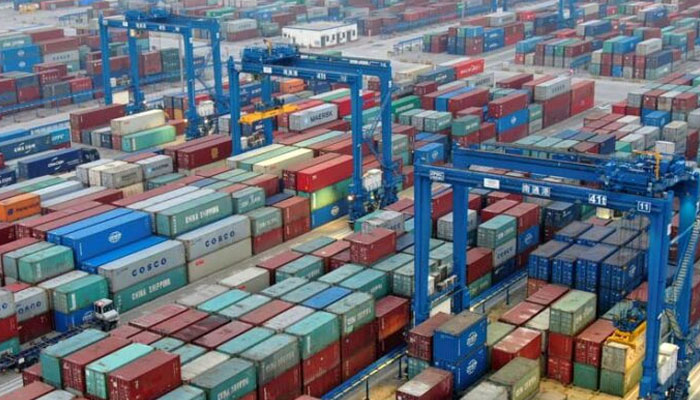Govt to remove additional custom duties on 152 tariff lines
Islamabad: The Tariff Policy Board (TPB) on Thursday approved working on removal of additional custom duties on 152 tariff lines to provide cheap raw materials to the industrial sector and reduce cost of doing business.
TPB, during the 16th meeting presided over by Adviser to the Prime Minister on Commerce Razak Dawood, emphasised the need to remove anomalies in the tariff structure to reduce ease of doing business.
“The removal of anomalies will also help in improving competitiveness of Pakistani exports vis-à-vis its trading partners,” a statement quoted the board as saying.
The government abolished import duties on 1,623 tariff lines, pertaining to basic raw materials and intermediate goods through the Finance Act, 2020. Besides, additional customs and regulatory duties on 164 items related to textile sector, not manufactured in Pakistan, were also removed.
The meeting also discussed different proposals to remove additional customs duties on remaining raw materials, not manufactured in the country.
The government is gradually phasing out duties on industrial raw materials to revive laggard manufacturing sector. It planned to abolish additional customs and regulatory duties on 30,000 items of raw materials this fiscal year. The tariff rationalisation will have negative revenue impact of Rs14 billion in 2020/21.
The government realised the importance of shifting revenue reliance from imports to other taxes, such as sales tax and income tax. Currently, 45 percent of taxes are collected at import stage, while in India it stands at 21 percent, Bangladesh (28 percent) and developed world (10 percent).
Dawood said sectoral studies ought to be completed within the given time line so that tariffs rationalisations could be done in the sectors by taking into account the recommendations of the studies.
At the end of the meeting, the adviser said in pursuance of the objectives of National Tariff Policy 2019-24, meetings of the TPB are being held on regular basis.
“Prior to this policy, proposals regarding tariff rationalisations were mostly discussed at the time of budget exercise,” he said. “The tariffs are being used as instrument of trade policy so that manufacturing sector in Pakistan could be strengthened.”
Large scale manufacturing sector continued to post contraction for the past two years with the government’s urge to reduce current account deficit through import restriction adversely hurting the industrial sector dependent on imports of raw materials.
While current account position has turned into surplus, exports continued to show weakness despite depreciation of rupee against the US dollar to encourage exports and improve competitiveness of Pakistan’s industries.
-
 South Korea: Two Killed As Military Helicopter Crashes During Training
South Korea: Two Killed As Military Helicopter Crashes During Training -
 Elon Musk Unveils SpaceX’s Moon-first Strategy With ‘self Growing Lunar City’
Elon Musk Unveils SpaceX’s Moon-first Strategy With ‘self Growing Lunar City’ -
 Donald Trump Slams Bad Bunny's Super Bowl Performance: 'Absolutely Terrible'
Donald Trump Slams Bad Bunny's Super Bowl Performance: 'Absolutely Terrible' -
 Jake Paul Criticizes Bad Bunny's Super Bowl LX Halftime Show: 'Fake American'
Jake Paul Criticizes Bad Bunny's Super Bowl LX Halftime Show: 'Fake American' -
 Prince William Wants Uncle Andrew In Front Of Police: What To Expect Of Future King
Prince William Wants Uncle Andrew In Front Of Police: What To Expect Of Future King -
 Antioxidants Found To Be Protective Agents Against Cognitive Decline
Antioxidants Found To Be Protective Agents Against Cognitive Decline -
 Hong Kong Court Sentences Media Tycoon Jimmy Lai To 20-years: Full List Of Charges Explained
Hong Kong Court Sentences Media Tycoon Jimmy Lai To 20-years: Full List Of Charges Explained -
 Coffee Reduces Cancer Risk, Research Suggests
Coffee Reduces Cancer Risk, Research Suggests -
 Katie Price Defends Marriage To Lee Andrews After Receiving Multiple Warnings
Katie Price Defends Marriage To Lee Andrews After Receiving Multiple Warnings -
 Seahawks Super Bowl Victory Parade 2026: Schedule, Route & Seattle Celebration Plans
Seahawks Super Bowl Victory Parade 2026: Schedule, Route & Seattle Celebration Plans -
 Keto Diet Emerges As Key To Alzheimer's Cure
Keto Diet Emerges As Key To Alzheimer's Cure -
 Chris Brown Reacts To Bad Bunny's Super Bowl LX Halftime Performance
Chris Brown Reacts To Bad Bunny's Super Bowl LX Halftime Performance -
 Trump Passes Verdict On Bad Bunny’s Super Bowl Halftime Show
Trump Passes Verdict On Bad Bunny’s Super Bowl Halftime Show -
 Super Bowl 2026 Live: Seahawks Defeat Patriots 29-13 To Win Super Bowl LX
Super Bowl 2026 Live: Seahawks Defeat Patriots 29-13 To Win Super Bowl LX -
 Kim Kardashian And Lewis Hamilton Make First Public Appearance As A Couple At Super Bowl 2026
Kim Kardashian And Lewis Hamilton Make First Public Appearance As A Couple At Super Bowl 2026 -
 Romeo And Cruz Beckham Subtly Roast Brooklyn With New Family Tattoos
Romeo And Cruz Beckham Subtly Roast Brooklyn With New Family Tattoos




